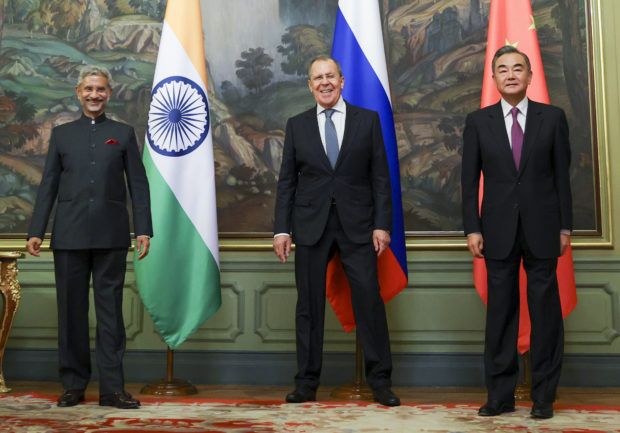India, China agree to disengage thousands of border troops

In this photo released by the Russian Foreign Ministry Press Service, India’s Foreign Minister S. Jaishankar, left, Russia’s Foreign Minister Sergey Lavrov, and China’s Foreign Minister Wang Yi, pose for a photo on the sidelines of a meeting of Foreign Ministers of Shanghai Cooperation Organisation, Commonwealth of the Independent States and Collective Security Treaty Organization Member States in Moscow, Russia, Thursday, Sept. 10. 2020. (Russian Foreign Ministry Press Service via AP)
NEW DELHI — The Indian and Chinese foreign ministers agreed their troops should disengage from a tense border standoff, maintain proper distance and ease tensions in the cold-desert Ladakh region where the two sides had their deadliest clash in decades in June.
India’s S. Jaishankar and China’s Wang Yi met in the Russian capital on Thursday night and concurred that “the current situation in the border areas is not in the interest of either side,” according to the joint statement issued Friday.
Since last week, the Asian giants have accused each other of sending soldiers into the rival’s territory and firing warning shots for the first time in 45 years, threatening a full-scale military conflict.
They did not set any timeline for the disengagement of tens of thousands of troops in a standoff since May, but agreed that “both sides shall abide by all the existing agreements and protocol on China-India boundary affairs, maintain peace and tranquility in the border areas and avoid any action that could escalate matters.”
Earlier this week, Jaishankar described the current situation along the Line of Actual Control as “very serious” and said the state of the border cannot be separated from the state of the relationship.
Article continues after this advertisementOn Thursday, the two countries agreed that as the situation eases, they should expedite work to conclude “new confidence-building measures to maintain and enhance peace and tranquility in the border areas.”
Article continues after this advertisementIn a separate statement, Wang said “China-India relations have once again come to a crossroads.”
Wang “outlined China’s stern position on the situation in the border areas, emphasizing that the imperative is to immediately stop provocations such as firing and other dangerous actions that violate the commitments made by the two sides,” the statement said.
“It is also important to move back all personnel and equipment that have trespassed. The frontier troops must quickly disengage so that the situation may de-escalate,” it quoted Wang as saying.
They met on the sidelines of a gathering of the foreign ministers of the Shanghai Cooperation Organization. The body comprises China, India, Pakistan, Russia, Kazakhstan, Krgyzstan, Tajikistan, and Uzbekistan.
The disputed 3,500-kilometer (2,175-mile) border between the world’s two most populous countries stretches from the Ladakh region in the north to the Indian state of Sikkim. The latest standoff is over portions of a pristine landscape that boasts the world’s highest landing strip and a glacier that feeds one of the largest irrigation systems in the world.
Both sides accuse the other of provocative behavior including crossing into each other’s territory and both have vowed to protect their territorial integrity.
The two nations fought a border war in 1962 that spilled into Ladakh and ended in an uneasy truce. Since then, troops have guarded the undefined border area, occasionally brawling. They have agreed not to attack each other with firearms.
Rival soldiers brawled in May and June with clubs, stones, and their fists with a clash on a high ridge June 15 leaving 20 Indian soldiers dead. China reported no casualties.